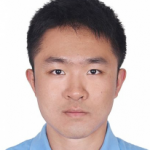The UW-Madison site of IFDS is funding several Research Assistants during Spring semester 2021 to collaborate across disciplines on IFDS research. Each one is advised by a primary and a secondary adviser, all of them members of IFDS.
Shi Chen

Shi Chen (Mathematics), advised by Qin Li (Mathematics) and Stephen J. Wright (Computer Science), works on problems in the interdisciplinary area of applied math and machine learning. He is interested in connecting machine learning to various mathematical physics problems, including the homogenization of PDEs and inverse problems. His recent work focuses on applying deep learning to PDE inverse problems.
Jeffrey Covington
 Jeffrey Covington (Mathematics), advised by Nan Chen (Mathematics) and Sebastien Roch (Mathematics), works on data assimilation for model state estimation and prediction. His primary focus is on models with nonlinear and non-Gaussian features, which present problems for traditional data assimilation techniques. Currently he is working on developing techniques for Lagrangian data assimilation problems, which typically involve high-dimensionality and strong nonlinear interactions.
Jeffrey Covington (Mathematics), advised by Nan Chen (Mathematics) and Sebastien Roch (Mathematics), works on data assimilation for model state estimation and prediction. His primary focus is on models with nonlinear and non-Gaussian features, which present problems for traditional data assimilation techniques. Currently he is working on developing techniques for Lagrangian data assimilation problems, which typically involve high-dimensionality and strong nonlinear interactions.
Changhun Jo
 Changhun Jo (Mathematics), advised by Kangwook Lee (Electrical and Computer Engineering) and Sebastien Roch (Mathematics), is working on the theoretical understanding of machine learning. His recent work focuses on finding an optimal data poisoning algorithm against a fairness-aware learner. He also works on finding the fundamental limit on sample complexity of matrix completion in the presence of graph side information.
Changhun Jo (Mathematics), advised by Kangwook Lee (Electrical and Computer Engineering) and Sebastien Roch (Mathematics), is working on the theoretical understanding of machine learning. His recent work focuses on finding an optimal data poisoning algorithm against a fairness-aware learner. He also works on finding the fundamental limit on sample complexity of matrix completion in the presence of graph side information.
Liu Yang

Liu Yang (Computer Sciences) advised by Robert Nowak, Dimitris Papailiopoulos and Kangwook Lee (Electrical and Computer Engineering), works on the intersection of machine learning and deep learning. Currently, she is working on the streaming model selection problem under limited memory resources.
Xuezhou Zhang
 Xuezhou Zhang (Computer Sciences), advised by Jerry Zhu (Computer Sciences) and Kevin Jamieson (U of Washington), works on adaptivity and robustness in sequential decision making. His recent work focuses on designing reinforcement learning framework that learns from a diverse source of teaching signals and learns robustly in the presence of data corruptions.
Xuezhou Zhang (Computer Sciences), advised by Jerry Zhu (Computer Sciences) and Kevin Jamieson (U of Washington), works on adaptivity and robustness in sequential decision making. His recent work focuses on designing reinforcement learning framework that learns from a diverse source of teaching signals and learns robustly in the presence of data corruptions.
Shashank Rajput

Shashank Rajput (Computer Science), advised by Dimitris Papailiopoulos (Electrical and Computer Engineering), Kangwook Lee (Electrical and Computer Engineering) and Stephen Wright (Computer Science), works on problems in distributed machine learning and optimization. He works on developing techniques which are fast and scalable for practical use, and have theoretical guarantees. Currently, he is working on finding better shuffling mechanisms that beat random reshuffling as well as developing algorithms for training neural networks by only pruning them.
Shuqi Yu
 Shuqi Yu (Mathematics), advised by Sebastien Roch (Mathematics) and working with Karl Rohe (Statistics) on large scale network models. She aims to establish theoretical guarantees for a new estimator of the number of communities in a stochastic blockmodel. She is also interested in phylogenetics questions, in particular, she works on the identifiability of the species phylogeny under an horizontal gene transfer model.
Shuqi Yu (Mathematics), advised by Sebastien Roch (Mathematics) and working with Karl Rohe (Statistics) on large scale network models. She aims to establish theoretical guarantees for a new estimator of the number of communities in a stochastic blockmodel. She is also interested in phylogenetics questions, in particular, she works on the identifiability of the species phylogeny under an horizontal gene transfer model.
